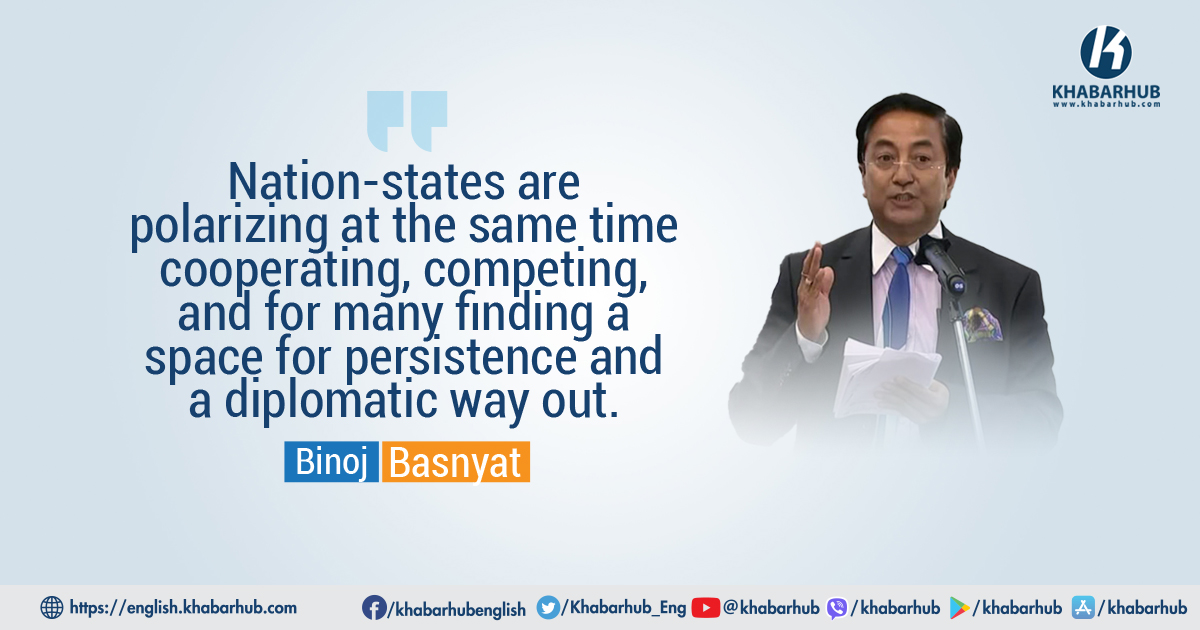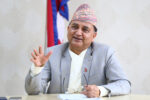Summits have been a podium for influential world leaders to forge alignment, alliances, or both.
Multilateral and mini-lateral diplomacy and multipolarity have also subsisted as confidence above all for the balance of power when it may not be controversial to point out that the UN seems incapacitated.
September, the month of the summits and the global governance system, started with the Association of Southeast Asian Nations (ASEAN), Group of 20 (G20), Group of 77 plus China (G77), and ended with the 78th session of the UN General Assembly.
2023 commenced with two geostrategic bearings; one marking the 40th anniversary of the normalization of diplomatic relations between China and the US, and the other being a year of geopolitical readjustment and maneuvering with added perceptible rivalry, as well as the virtual “Voice of the Global South Summit” hosted by both China and India.
In addition, the Global Community of Shared Future of China was announced on 26th September, one year after the G7 Partnership for Global Infrastructure and Initiative revealed in June 2022.
Nine countries in the Shanghai Cooperation Organisation (SCO) were virtual and were enlarged, like the last five nations in the Brazil, Russia, India, China, South Africa (BRICS) summit held last month in Johannesburg.
The G20 also got enlarged, making it more a moment for India with challenges from China mirroring.
President Xi’s and President Putin’s absence and the announcement of Supreme Leader Kim Jong Un’s visit to Russia have geostrategic consequences.
One common geographic platform for enlargement has been the Persian Gulf and two continents, Africa and Europe, for geopolitical readjustment.
Chinese Premier Li Qiang, Russian Foreign Minister Sergei Lavrov, and US Vice President Kamala Harris joined the 43rd summit in Jakarta of the ASEAN with no new conflicts urged by the host country, no taking sides by China, and no change to the maritime status quo by the US against a backdrop of big-power rivalries.
The takeaways of G20 with India-Middle East-Europe economic Corridor (IMEEC) and G77 with Belt and Road Initiative (BRI), CHIP-4, and the Trilateral Cooperation with Camp David Trilateral Leaders’ Summit are appealing to explore in search of a new form of alignment with the Global South as a primacy.
SCO and BRICS offer a forceful stage for firming up South-South cooperation outside the purview of supervision by the US and European powers.
This also exhibits a multipolar authenticity/world in which China, India, and Russia, all Asian countries, are undertaking a growing role in positioning their interests in economic and diplomatic consortiums.
G20 has been a strategic viability for India, the West, and democracies to unitedly promote multilateralism for the geoeconomic revolution for the new world order when President Putin uses his veto for an unjust war, in addition to when China and the US barely commend consensus.
China is persuading the G77 with genuine assurances in opposition to the US-led West.
The Trilateral Cooperation Secretariat (TCS) was established on 1st September 2011 among China, Republic of Korea (ROK), and Japan to promote lasting peace, common prosperity, and shared culture.
At the same time, August 15 witnessed the first Trilateral Leaders’ summit in Camp David advancing security and prosperity in the Indo-Pacific region and the world between Japan, the US, and ROK.
With semiconductors taking center stage for technological advances, the consultative entity, FAB 4 alliance or CHIP 4, was formed.
The alliance includes four of the world’s top producers and democracies: Japan, ROK, Taiwan, and the US.
It represents more than 70 percent of the value of the global semiconductor industry to persuade coordination and cooperation midst governments and chipmakers in the entire phases of the semiconductor supply chain.
G20 started with the theme “One Earth, One Family, One Future” when the East-West polarization was resilient and North-South division profound as a national endeavor of India.
The takeaways of G20 with India-Middle East-Europe economic Corridor (IMEEC) and G77 with Belt and Road Initiative (BRI), CHIP-4, and the Trilateral Cooperation with Camp David Trilateral Leaders’ Summit are appealing to explore in search of a new form of alignment with the Global South as a primacy.
Return of the Global South
The third bloc in the bipolar world or during the Cold War played an important part in preventing a full-scale war.
South-South cooperation is for wielding tangible power for the geoeconomic revolution with reliance on the liberal economic order and Chinese commercialism, as well as the trade wars and sanctions with amassed eagerness throughout the pandemic and the war in Ukraine.
The real world endures outside the great powers or even outside the G7 and their principal ally’s utmost compromise of nation-states from Africa, Asia, the Caribbean, and Latin America though is regarded as a home to Brazil, India, Indonesia, and China along with Nigeria and Mexico placed in or nearby the tropics.
They are the largest Southern states in terms of land area and population.
Most of these nations defied opting positions in Russia’s war in Ukraine, aligning as the “Nonaligned World” and expressing to be a key factor in geopolitics.
Realism and not moralism in addition to geopolitical maneuvering vitalities the geopolitical landscape outlined by the strains amongst the US and its power rivals China and Russia.
2023 also commenced with Modi hosting a virtual “Voice of the Global South Summit” that included 125 nations with the nonattendance of China and Pakistan.
The US desires G7 as a navigating group as stated by US National Security Advisor Jake Sullivan, that G7 is the “steering committee of the free world.”
G20 started with the theme “One Earth, One Family, One Future” when the East-West polarization was resilient and North-South division profound as a national endeavor of India.
It was also a moment for upholding the ‘Voice of the Global South.’ BRICS declared its goal to ‘advance the agenda of the Global South.’
The Japanese PM Fumio Kishida invited Australia, Brazil, Chairs of the African Union, Pacific Islands Forum (PIF), ASEAN, India, Indonesia, Republic of Korea, and Vietnam in the Group of Seven (G7) wealthy democracies summit stressed that the guest nations invited reflected the importance of the Global South.
The UN, the World Bank, and US President Biden are replicating the Global South as a geopolitical tool.
BRICS and the expansion with more than 42 percent of the world’s population, 30 percent of the territory from the Persian Gulf to Latin America is another geostrategic notion by China and Russia with an aim to further political space in the Global South.
There are 22 countries officially asking to join and more than 20 others communicating their interests as it pursues to challenge western supremacy.
In its impetus to rearrange the out-of-date world order, the developing nations have been attracted to the sounds of an equitable global governance system and creating an economic bloc that accounts for about a third of the global economy by means of reinforcing an inclusive multilateral system with support to fostering the creation of a multipolar global order.
Search for Non-Alignment 2.0
When the world is witnessing one of the Permanent Five (P5) of the UN Security Council, Russia launches an offensive in another member UN country Ukraine, creating uncertainty in Europe, when the US, another P5 member, supports Israel in an indiscriminate bombing in Gaza and voted against a UN General Assembly resolution demanding an “immediate humanitarian ceasefire,” the immediate and unconditional release of all hostages, and ensuring humanitarian access.
Nation-states are polarizing at the same time cooperating, competing, and for many finding a space for persistence and a diplomatic way out.
It passed with a large majority of 153 in favor and 10 against, with 23 abstentions. When China, another P5 member, is in search out for patronage and influence as a global player with a centralized ideological system of governance.
In addition, P5 members China and the US barely have a common standpoint on any global issues.
There is a big question of multilateralism when it is time to consider how to reform an institution that was born in a different era, 78 years ago when the Global South was haunted by hunger.
Multilateralism is being replaced by big power influence.
The US desires G7 as a navigating group as stated by US National Security Advisor Jake Sullivan, that G7 is the “steering committee of the free world.”
Scholar G John Ikenberry of Princeton University writes that Russia’s war and China’s rise are turning a talking shop into a fledgling alliance of democracies, and G7 is a platform. US, EU, and China’s officials’ relentless visits to nation states in South Asia stand at a pivotal juncture for alliances and alignment and a broader global landscape.
French President Emmanuel Macron was in Dacca with two specific goals: one to strengthen the French Indo-Pacific strategy and counterbalance China’s extended influence, and second, enduring democratic principles and the rule of law to counter “new imperialism” in the region.
The Chief of the Army of Pakistan’s visit to the US contests the ‘all-weather’ relationship with China and the US posture in West South Asia.
The western idea of ‘collective security’ with NATO in the Indo-Pacific region for understanding, stalking, and neutralizing Chinese narratives about alliances is a preparation of a periphrastic commencement of hostilities in China’s view.
South Asian elections are viabilities; in Bangladesh in January, in India during April-May, and in Pakistan in February.
Bhutan also goes out for National Assembly election in January. These are all not applauded both in Beijing and Moscow.
The invasion of Taiwan by China has not been ruled out even into 2024 with China and Russia’s ‘no limit’ relationship.
The featuring of the Global South competing through international organizations like the G20, G77, TCS, Trilateral Alliances, CHIP 4 alliances, and QUAD by the global rivals China and the US and the regional competitor China and India, China and Japan cautions and drives nation-states and other regional multilateral and minilateral organizations in question in international relations.
Is there a space for ‘non-Alignment’ or a strategic milieu for idiosyncratic ‘Alignment’ is the essential question that arises within states that are in search of prosperity and stability as a national strategic priority through economic diplomacy as the vehicle in international relations.
Conclusion
Nation-states are polarizing at the same time cooperating, competing, and for many finding a space for persistence and a diplomatic way out.
China and Russia cooperate in almost all international proceedings. Kim Jung Un’s visit to Russia post G20 is also partnering military capabilities, making it a trilateral congregation.
With its formation, TSC is fulfilling its objectives to uphold peace, prosperity, and shared culture.
On the other hand, quadrilateral arrangements (QUAD) amongst Australia, Japan, India, and the US are being backed by NATO and the EU, as well as the Camp David trilateral summit for security and prosperity in the Indo-Pacific region and the world between Japan, ROK, and the US, is enduring, retaining geo-security-political implications.
CHIP 4 alliances will acquire the centerpiece of discussions on global economic security.
Friendshoring also possesses an important role in the formation of the global technological order, with the impacts of economic competition between China and the US spilling over to the rest of the world.
Allyshoring amongst chip-related industries, governments will likely make up a new trade bloc to continue accessing the international market and supply chains while reducing certain geopolitical risks and risking expensive manufacturing and eased economic turnout.
The clash of worldviews amid national sovereignty and transnational challenges over borders in maritime and territorial that feature bilateral, regional, and multilateral diplomacy is contested.
The featuring of the Global South competing through international organizations like the G20, G77, TCS, Trilateral Alliances, CHIP 4 alliances, and QUAD by the global rivals China and the US and the regional competitor China and India, China and Japan cautions and drives nation-states and other regional multilateral and minilateral organizations in question in international relations.
(The author is a Strategic Analyst, Major General (Retd) of the Nepali Army, and is associated with Rangsit University, Thailand.)









Comment